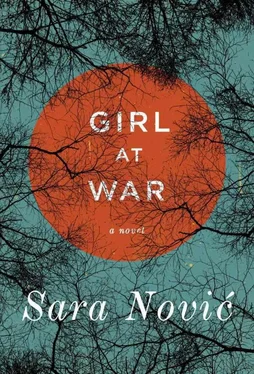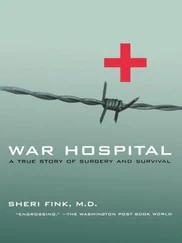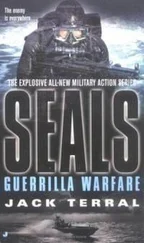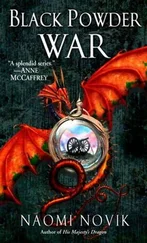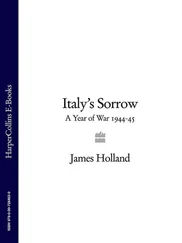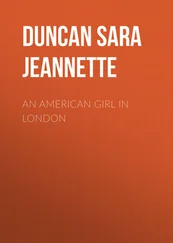“I don’t know what to say,” I whispered as he swung a leg over his bicycle.
“So don’t say anything. When you come back, it will be like you never left.” He stood up on his bike pedals and bounced down the gravel drive, then turned the corner out of sight.
—
I woke in the dark with Petar standing over me.
“Sorry,” he said. “It’s time.”
“I’m awake.” I dressed in the only clothes I hadn’t packed. I went to the bedroom to say goodbye to Marina, kissing her on the cheek.
“Be safe,” she murmured. “And take care of Rahela.”
“Come. Be my co-pilot,” Petar said, motioning to the passenger seat. He was wearing his army uniform with the left sleeve cut off to accommodate the brace. He put a yellow envelope in my lap and backed out of the driveway. “Now this is very important. These are all your documents — ticket, passport, contact information for the family, letter of invitation, and”—he reached in his pocket and stuffed some dinar into the envelope—“something extra in case anyone gets hungry.”
“Hungry?”
“Not for food,” he said, tapping the envelope. “You’ll find powerful men can often be persuaded. At least they can here. I don’t know about America. Don’t worry. You’ll know if you need it. Subtlety is not the military way. Now. When you get to Germany—”
“Don’t leave the international terminal,” I said, remembering Srdjan’s instructions.
“Good. And when you get to New York?”
I gave him a blank look. I couldn’t remember any advice about America.
“Just play it cool!” he said. “They’re going to meet you at the airport, so once you make it through customs, you’re home free.”
I leafed through the papers. I went back to the start of the pile and looked through them again. There was only one ticket.
“This says Frankfurt — New York. Where’s the other half?” I’d assumed the American visa would be the hardest component to procure; I hadn’t considered that getting out of this country would be a problem. But the more I thought about it, the more frightened I became. Of course no company would be stupid enough to fly commercial planes in war zone airspace.
“I’ve made arrangements,” Petar said.
“How did you find all these people to help us?”
“I’ve always known people. You just didn’t notice. You were young.”
The airport was ringed by white vehicles: smooth-front supply trucks with covered flatbeds, fuel carrier tankers, shiny white SUVs, even a series of white tanks, all bearing UN in bold black paint. On both sides of the fence, the area was swarming with Peacekeepers, their helmets and flak jackets almost luminous in the diffuse dawn light. But Petar drove past the entrance. I waited for him to turn in to a side gate or service road. Instead he got on the highway, southbound.
“Petar. The airport?”
“We’re not going there,” he said.
“What do you mean?”
“Too heavily guarded. They check the planes.”
“Then where are we going?”
“Otočac.”
“Otočac! Do they even have an airport? Aren’t there Četniks down there?”
“We’re counting on it,” he said. “Right now, disorder is our friend. No one will notice you.”
“But—”
“But nothing,” he said. The sun was red with morning, and I stared at my feet to avoid the glare. We rode in silence until I no longer recognized anything.
“We’re going to get you out of here,” Petar said. “When we get to Otočac, a Peacekeeper named Stanfeld will meet us.”
“I’m scared,” I said.
“You should be.”
“What?”
“It’d be weird if you weren’t.”
“The UN. Why is he helping us?”
“It’s a woman,” Petar said. “And I saved her life.”
“Is that how you hurt your arm?”
“Nah. She was on my day off.” Pleased with himself, he gave way to a smile I couldn’t help but return. Petar put his hand on my knee. “She’ll take care of you.”
After about an hour, we passed into Lika and arrived on the outskirts of Otočac. Farmland gave way to small clusters of beige and red-clay-roofed houses along the road. Most of them had been shelled and were in varying states of disrepair.
“Shit,” said Petar, and I looked ahead to see bearded men in the road. “For fuck’s sake.”
“What do we do?”
“Get in the back and lie on the floor and don’t move until I tell you,” he said. I stuffed the envelope in the waistband of my pants, climbed over the gearshift, and pressed my face against the dirty floor mat. Petar threw a blanket over me and submitted to the checkpoint.
I heard him crank down the window, then a stranger’s voice, close: “Can I help you?”
“I’ve got a delivery,” Petar said, and I heard the crinkling of paper, wondered if it was some instruction sheet or dinar to quench the “hunger” he’d mentioned.
“This road is closed. You need to turn around.”
“Haven’t you people heard of a cease-fire?” said Petar.
“I heard the JNA agreed to one. Luckily, I’m not in that army.”
“Look, I have a delivery. Commander Stanfeld.”
“There’s no Stanfeld here,” the soldier said, repeating the foreign last name with some difficulty.
“She’s UN.”
“She?” he said, amused. “There’s no UN here.”
“You better check your messages,” said Petar. “They’re at the airport right now, and there’ll be hell to pay if you make them wait.”
“I don’t take orders from Peacekeepers.” Paper rustling again. “Hold on.” A radio beeped, and the soldier asked about a delivery, the staticky reply indiscernible.
“Well, comrade. My commander doesn’t know about your delivery. So I’m going to have to ask you to step out of the car.”
“Sure thing,” said Petar, but I could see him sliding his hand into the skinny space between seats, past his seat belt, where the glint of gunmetal caught my eye.
“Hurry up! Out!”
“Ana, count to three, then run to the center post office,” he whispered.
“What?” the soldier said.
“Sorry,” Petar said, and I heard him open his door. “I’m just—”
I heard the pop of gunfire and flew from the car, still clutching the blanket around my shoulders. The Četnik was on the ground holding his face, and Petar was running into the scrub across the road, distracting the other soldiers as I darted through the fields down into the town.
“Goodbye!” I yelled to Petar, though I knew he wouldn’t hear. Would he be able to fight or get away with his bad arm? Maybe if I ran fast enough and found Stanfeld, the UN could send Blue Helmets to help him. The streets were potholed and gravelly from mortars, and I tried not to trip.
Compared to Zagreb, Otočac was a squat town. The houses looked the same — the familiar tan and white façades and clay roofs — but there were no tall buildings here, nothing more than a few stories, so it was hard to find the center of town. There weren’t many people on the street, and no one noticed me.
“Post office?” I said to a man slumped on the corner drinking rakija from the bottle.
“Doesn’t work,” he said.
“I know, but where is it?”
“What good is it if it’s closed?”
“Forget it.”
“Two streets up. Next to the closed bakery and the closed bank and the closed—”
“Thanks.” I ran the two blocks, but there was no one out in front of the post office and it looked dark inside. The air raid siren began to sound.
Through the alley and around the back, I found a woman in Peacekeeping uniform. She adjusted her ponytail beneath her helmet, looked at her watch. I tapped her on the arm.
“Well, what do we have here?” she said in English. She gestured to my blanket. “Are you Superwoman?” I was intimidated by her language and her uniform, but needed her to send help for Petar, so I concentrated on the words I’d learned in school and from my mother.
Читать дальше
